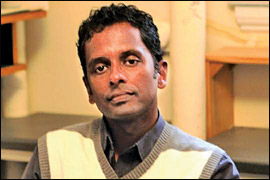Figuring out one’s own kind
 A
new phase has begun in writing from the Indian sub-continent with the
emergence of the Sri Lankan writer Romesh Gunasekara, whose novel Reef
was shortlisted for the Booker Prize. The author describes it as a story
of a society in transition, but also one that “illuminates the
political, moral and emotional realities we all live by, whatever our
circumstances and our obsessions.” A
new phase has begun in writing from the Indian sub-continent with the
emergence of the Sri Lankan writer Romesh Gunasekara, whose novel Reef
was shortlisted for the Booker Prize. The author describes it as a story
of a society in transition, but also one that “illuminates the
political, moral and emotional realities we all live by, whatever our
circumstances and our obsessions.”
The face value of this statement was enhanced by Shyam Selvadurai’s
novel ‘Funny Boy’ which was published in 1994. Funny Boy won the Lambda
Literary Foundation’s Award for Best Gay Male Novel as well as the
Smithbooks/Books in Canada First Novel Award for 1994. Selvadurai was
born in Colombo in 1965, but left after the 1983 riots there to settle
with his family in Toronto.
|

Shyam Selvadurai |
Initially ‘Funny Boy’ tells a story of a Sri Lankan Tamil family who
flee to Canada to get escaped from 83’ riots. The protagonist of Funny
Boy is Arjun Chelvaratnam, referred to as Arjie by his family and
friends. Arjie is barely six or seven years old when the novel opens. By
the time it ends, he is on the threshold of adolescence, trying to come
to terms with his homosexuality.
In his novel, Selvadurai introduces the Sri Lankan readership a new
genre of fiction which is called queer literature. Queer is by
definition whatever is at odds with the normal, the legitimate, the
dominant. It is an identity without an essence. ‘Queer’ then, demarcates
not a positivity but a positionality vis-à-vis the normative.
Heavily influenced by the work of Michel Foucault, queer theory
builds both upon feminist challenges to the idea that gender and close
examination of the socially constructed nature of sexual identities.
Selvadurai’s novel is not merely a piece of queer literature.
Throughout ‘Funny Boy’, Selvadurai presents a group of people who are
discriminated in various aspects. In broader sense, queerness covers up
the sexual order which is deeply embedded in social institutions.
Although his extended family are not entirely orthodox, they still
endorse male supremacy, with the father the head of the family and
breadwinner, and the mother having to submit to his decisions and
opinions even if she finds herself in disagreement with them. This is
true of Arji’s own parents, Appa and Amma, his grandparents, Appachi and
Ammachi, as well as his numerous aunts and uncles.
Salvadurai calls Funny Boy a novel in six stories. While these
stories are interconnected, with Arjie figuring in all of them, they are
slightly more autonomous than the mere chapters of a novel would be.
Thus the first and the last stories are about Arjie himself; the
second is about Radha Aunty, who returns from America and dares to
respond to the advances of a Sinhalese boy although her family are
fixing up her wedding with a Tamil they know; the third concerns the
Burgher Daryl Brohier, who was once Amma’s lover; the fourth is about
Jegan, the son of an old chum of Appa’s who has connections to the
terrorists; and the fifth involves Soyza, or Shehan, who initiates Arjie
into a relationship.
Funny Boy was translated to Sinhala by Sugathapala De Silva as ‘
Amuthu Ilandariya’.
This is a brave attempt in the Sri Lankan Sinhala literary atmosphere
as it touches most sensitive subject matter.
Apart from the controversial queer theme, ‘Funny Boy’ keeps permanent
scars on a reader, which are not essentially queer related. It talks
about love and humanity – especially in a crisis situation like ethnic
riots.
Arji’s aunt Radha marries Rajan Nagendra “because most people marry
their own kind”. She was earlier in love with a Sinhalese boy but was
forced to give up him due to racial incompatibilities.
Ironically, Arjie would later find happiness in life if this were a
universal truth. But it is not; it applies only to race, not to gender.
While racial relationships are located in homogenity, sexual
relations are not: men and women cannot marry their own kind.
Arjie says, “I couldn’t bear to watch the ceremony. I turned away”. |



